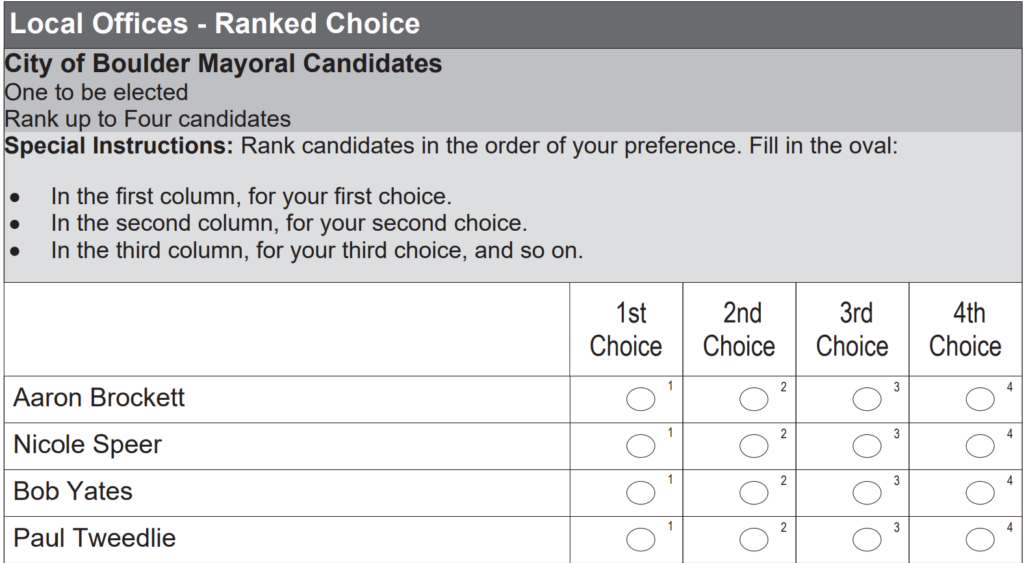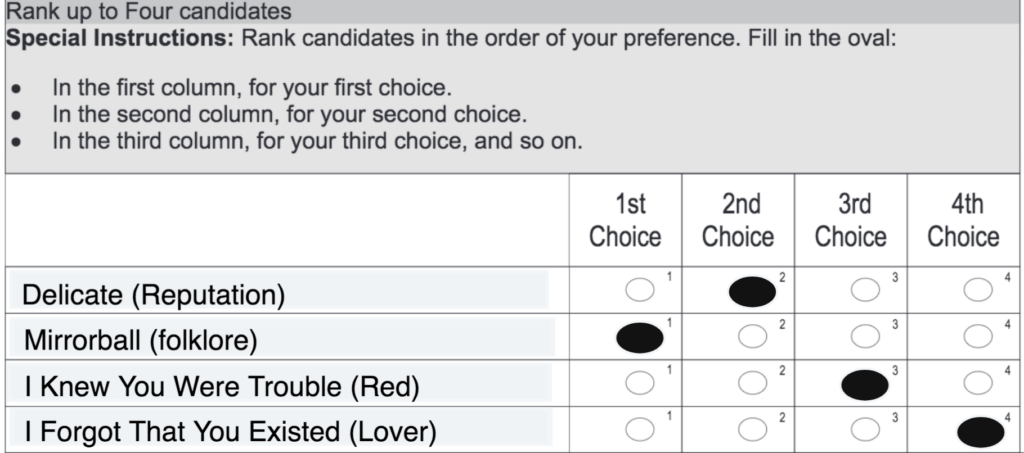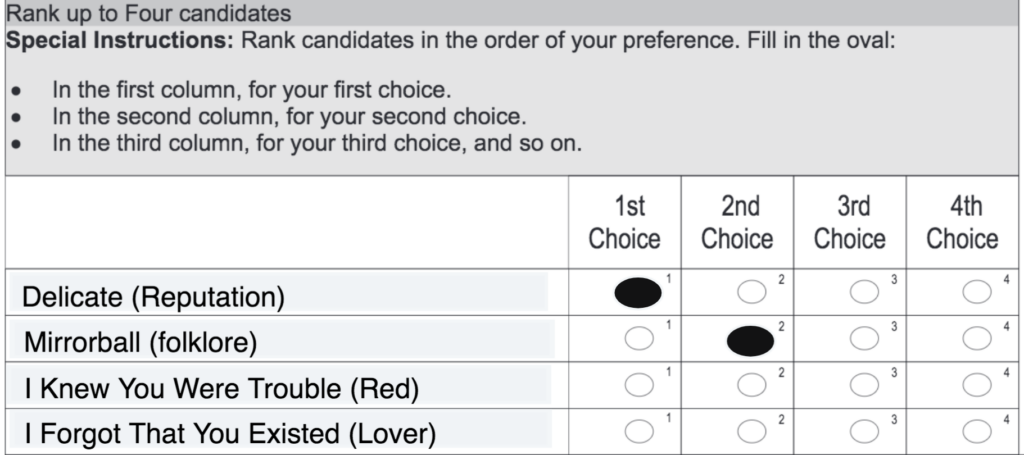Picking Boulder’s mayor: How, why and what does it change?
 Monday, Oct. 2, 2023
Monday, Oct. 2, 2023
This fall is Boulder’s first chance to pick its own mayor and the first test of ranked choice voting.
The why is easy: Voters decided in 2020 that they’d like to directly elect the mayor and to do so using ranked choice methods. The how is a bit more complicated.
Here’s how it will all work, and what we can expect from our first chosen mayor:
Ranked Choice Voting: Context and considerations
On your ballot, you’ll find four mayoral candidates and 16 bubbles. Rather than choosing just one, though, you simply fill in the corresponding bubbles indicating your first, second, third and fourth choices.
To demonstrate the nuances of voting while not influencing your vote, let’s do a demonstration using songs from musical icon and new Kansas City Chiefs’ fan Taylor Swift. We’re going to pretend you’ve been asked to rank four of her songs from four different albums.

These might not be the four songs you would have chosen: Someone, somewhere decided these would be the ones worth voting on. Maybe none of them are your favorite. That makes it a perfect analogy for voting, where the candidates supply themselves and you have to pick the best choice from whoever is running.
Now, you can rank these in order of most to least favorite, like so

But let’s say you can’t stand the thought of I Forgot That You Existed being heralded as Boulder’s best. It’s silly and shallow — everything Taylor’s worst critics think that she is. You’d hate for this to represent her vast and complex catalog to the unenlightened masses.
Come to think of it, you’re not that keen on I Knew You Were Trouble, either. Sure, it’s fun, but it lacks the lyricism and emotional depth of T-Swift’s best work. Plus, ever since that goat video (you know the one) you kind of associate this song with screaming barnyard animals.
No problem: You don’t have to rank all the choices. You can simply pick the ones you can live with and leave the rest blank.

To sum up: You can rank all the candidates, but you don’t have to. You might want to, because the advantage of RCV is that you get more than one vote: If your top choice isn’t everyone else’s, you can still cast a vote for your #2 (and so on and so forth).
When votes are counted, election officials look first at the No. 1 votes. If no candidate received a majority (50%-plus) of No. 1 rankings, the candidate with the fewest No. 1 picks is eliminated.
However, unlike in a traditional election, voters who picked that eliminated candidate get their second choice votes distributed to the remaining candidates.
This process continues until there is a candidate with a clear majority of the remaining votes. If you want more than one bite at the apple, rank all the candidates you could live with as Boulder’s mayor.
Still confused? Check out these other resources for explaining ranked choice voting:
City of Boulder guide (includes practice tool)
What’s changing about the mayoral role?
Other than the way they get elected, nothing.
In the past, council members chose the mayor via a majority vote. The mayor is truly one of their peers: they have no more say or power than any of the other eight members. They are one vote on a nine-member body where decisions are made collectively via a majority vote.
That’s not changing: a directly elected mayor will still be one of nine.
The mayor does have more duties than the average council member. They help set the agendas for meetings, and they represent Boulder on a number of boards and bodies. They are the public face of Boulder in many ways.
This news doesn’t write itself. Throw us some cash if you’ve got it, so we can keep this community news source free for all.
At a candidate forum and in interviews with Boulder Beat, mayoral candidates were asked how the viewed the role of an elected mayor versus a peer-appointed mayor. Here’s what they said (in the order they appear on the ballot):
Aaron Brockett: “I don’t think it’s changing really. You’re one member of nine; you have the same vote. If I am elected, I’ll keep doing what I’ve been doing for the last two years, which is getting out in the community on a daily basis, representing the city, supporting our nonprofits, keeping a sharp eye on the agenda, making sure everything is on track [and] representing the city in all our regional, national and state bodies.”
Nicole Speer: “The responsibilities are pretty much the same, the pay is the same. We help set the agendas, facilitate discussions, show up to events, offer words from the city. Those are the duties, and they’re not really going to change. What this elected mayor position does is give us the opportunity to change how this mayor does the work. To have a focus on inclusion, to foster debate, to keep our discussions on track. I think this issue of opening up spaces for other people is one of the most important things this mayor can do. It’s a culture change. That’s going to lead us to something better.”
Bob Yates: “Legally, it doesn’t change. The mayor is still one of nine council members with exactly one of nine votes. … The mayor also has the opportunity to move things along. The mayor serves on the council agenda committee [which sets the agenda for council meetings] so the mayor has some influence on the agenda. [They] have the opportunity to make sure that we get as much done in the limited number of hours. The mayor facilitates the regular council meetings. Can he or she, through efficiency, get more stuff done in the limited time we have? I would like to see us move things along a little faster.”
Paul Tweedlie: “As I understand it, the mayor get no more responsibilities or power than other eight members of city council, so the role is kinda a head for the town to rally behind. I’m not on City Council, so I can’t give you a detailed .”
You don’t see it, but this story took work: Research, multiple interviews with each candidate, attending public events, etc. If you value this in-depth information, consider paying for it.
— Shay Castle, @shayshinecastle
Want more stories like this, delivered straight to your inbox?
Elections Aaron Brockett Bob Yates Boulder Boulder County city of Boulder elections instant runoff instant runoff voting mayor mayoral election Nicole Speer Paul Tweedlie ranked choice voting RCV Taylor Swift voting
Sign up for a weekly newsletter from Boulder Beat.
Elections Aaron Brockett Bob Yates Boulder Boulder County city of Boulder elections instant runoff instant runoff voting mayor mayoral election Nicole Speer Paul Tweedlie ranked choice voting RCV Taylor Swift voting

